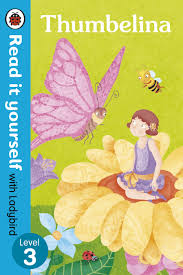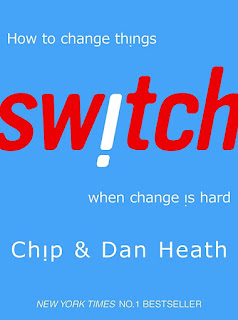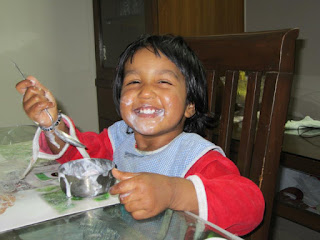 |
| Gimme wings! |
Inspired
by a message forwarded on Whatsapp, I narrated the story Rapunzel with a
feminist twist to my 6 year old daughter.
"And
Rapunzel flew out of the window of the castle on the back of a dragon…she was
freed of the wicked witch at last!"
“I
can continue the story from here”, quipped my daughter. I was pleasantly
surprised by her creativity.
“Sure”,
I said.
“So the
princess (it’s always princess, fairy, queen...) flew far away and finally landed
in a forest. She fell asleep and while she was sleeping a prince happened to
pass by. She was so beautiful that he fell in love with her and proposed to her.
She accepted, they were married and lived happily ever after!”
So
much for my heroic efforts to shatter stereotypes! The ideal of marrying a
prince, the ever alluring idea of being irresistibly attractive and the ultimate
achievement that we know is such a mirage…happily ever after! These are all
ideas that television, seemingly innocuous fairytales, online Barbie games, a
pouting Alia Bhat in movies like ‘Student of the Year’ - pound our children
with; even T-shirts that croon ‘Pretty princess’, girls posing and taking
endless selfies, advertisement featuring girls with long and strong hair, all
apparently harmless facets of everyday life that one cannot shield our children
from. You could argue that I am paranoid but there is a good reason for my
wanting to hide my children from these damaging influences.
We
all go through life with an image of who we are in our minds. That image is constantly
challenged as we traverse various stages of life. But to have an impressionable
child believe that she can conquer the world on the basis of her looks alone is
hollow, self defeating, delusionary and misleading. Moreover conquering the
world is not limited to bagging the best guy on the block. No Sir! It’s a lot
more than that and it may not even include that particular data point!
So
here are 6 hacks to shatter those stereotypes for the next generation.
1)
Change the endings of the popular fairy tales
To hell with Hans Christian Anderson! I propose we start a project to change the endings of all
the beloved but patriarchal stories like Snow White and Seven Dwarfs (Did she
have albinism? Why this colonial hangover about the complexion ‘white’? For me ‘Shyam’
is equally ‘Sundar’!)
Rapunzel
(Procter and Gamble, are you listening? We have a marketing idea for your
shampoos!)
Cinderella
– The story of a damsel in distress who was rescued fortuitously by a slipper
hunting prince.
Thumbelina
– An enchanting story about a thumb sized girl’s adventures in the animal world
marred by a super saccharine boring ending in her betrothal to another thumb
sized prince! Can we think a little out of the box here?
 |
| Thumbs Down! |
Sleeping
Beauty – A comatose princess under a curse, yet again rescued by a Prince…Very
consistent indeed!
(There
must have been a prolific supply of princes in those times, though I am not
sure they would have helped with changing nappies or putting kids to sleep!)
This is an indicative not an exhaustive list. All
readers are invited to let their imagination go wild and pen down the changed
stories in the comments below. It could be our first crowd-sourced book ever!
2)
Change the role models
Thankfully, in recent times, many a girl has
shattered the existing stereotype and has won accolades for India. Why can’t
our themed birthday parties revolve around the resilient Mary Kom or the
hardworking P.V.Sindhu or the defiant over achiever Sania Mirza, or a
rebellious Sakshi Malik? These are the athletes; I haven’t even got started on
the astronauts – Kalpana Chawla, Sunita Williams, the bureaucrats - Kiran Bedi,
the corporate stalwarts – Kiran Majumdar Shaw, Indra Nooyi, Kalpana Morparia. We could even talk about
Sanjeev Kapoor, Shiamak Davar or Ganesh Hegde, the famous choreographers. We do
not lack role models. Let’s just make them part of daily conversation.
3)
Stop the innocuous comments
Often
I find myself saying:
‘Take a bath quickly, don’t you want to look pretty!’
‘Talk
like a lady!’
‘Don’t
cry like a girl’
‘You
are looking so pretty’
And
others say:
‘School
mein dhup mein khada kar dete hain……. kali ho gayi hai’
And
I am sure that the last two dialogues appear to be perfectly harmless. But
think about the cumulative effects that these reactions might have on an
impressionable mind. When a guest comes and regularly compliments your daughter
as looking pretty, it appears to be normal party manners, but it actually could
have deep ramifications. She has a tall order to match up to each time! So much
so that I once heard of a lady who banished all such compliments (cute, pretty and
beautiful) from her household. Yes there are such pro-active people!
4)
Turn conventional knowledge on its head
The
fact of the matter is that cosmetic changes won’t work until the change is rooted in
reality. We are at a crossroads in time where most of us agree with the so
called ‘feminists’ and yet we cannot drag ourselves out of the paradox that our
lives have become. Children have the uncanny ability to come up with the most
confounding questions that are so unsettling! After a couple of weddings in the
family my daughter’s most common refrain were, “Why does the bride shift houses
each time?”
Apparently
my little one solved that issue in her version of Miss. Rapunzel.
‘…And
after the wedding they will all settle down like one big family - Rapunzel’s
parents and the Prince’s parents all in one big house!’
Just
like a child to come up with a simplistic solution to such a complex problem!
I challenge you – Can we be the change we want
to see; it could solve many of the man made problems in our lives. Can we come up with a less anachronistic and yet honest answer to this
question?
So
when your daughter asks you that, you can answer, “It’s flexible, honey!”
5) Rotate the chores handed out to kids
Imagine
this situation: You are suddenly expecting guests at home and have asked your
kids to pitch in. So your son runs to get the samosas and your daughter cleans
the living room. Right? Wrong! Don’t misunderstand me; there’s nothing wrong per
se with the situation described above, but it sends the wrong signals when
repeated time and again. These are deeply ingrained reflexes that we have
inherited from a generation steeped in patriarchal values. We are probably not
even aware of what we intuitively do and say to influence our children. So, next
time, pause, before delegating the chores.
6)
Be discrete in your 'casual' conversations
Do
you gossip with your neighbour and casually mention that ‘I can’t hire a
man-servant because it’s way too risky. My daughter is very young’?
What
if your children were in earshot? She could be forgiven for thinking that she
should feel threatened from men servants and all men in general. It tells the
kids that they are in need of protection always. Not a very empowering thought…..
It’s
tough tight rope-walking for us mothers. On the one hand we have to teach
youngsters to be aware of distressing issues like child abuse and on the other
hand they shouldn’t turn out to be scared wimps! After all we are the basis of
their self confidence, the belief that they hold in themselves. No matter how
rebellious a teenager might act out, their sense of security and well being
hinges on our beliefs.
Stereotypes
limit and confine us in a cocoon. They shackle children and prevent them from
achieving their potential. Boys are as much at the receiving end as girls, when they are discouraged to pursue a career in conventionally 'feminine' professions or are discouraged to show their emotions.
I will end with a quotation from the mystical guru and spiritual teacher Osho:
'Drop these ideas of being men and women! We are all human beings. To be a man or a woman is just a very superficial things. Don't make much fuss about it, it is not anything that important; don't make it a big deal.'








